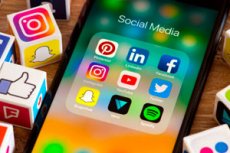New publications
Social media has been linked to nightmares, mental health and sleep quality
Last reviewed: 02.07.2025

All iLive content is medically reviewed or fact checked to ensure as much factual accuracy as possible.
We have strict sourcing guidelines and only link to reputable media sites, academic research institutions and, whenever possible, medically peer reviewed studies. Note that the numbers in parentheses ([1], [2], etc.) are clickable links to these studies.
If you feel that any of our content is inaccurate, out-of-date, or otherwise questionable, please select it and press Ctrl + Enter.

The more time you spend on social media, the more likely you are to have negative social media-related dreams that cause anxiety, disrupt sleep, and affect our peace of mind.
Reza Shabahang from Flinders University argues that the vast and rapid spread of social media may be influencing various aspects of life, including the realm of dreams.
"As social media becomes increasingly intertwined with our lives, its influence extends beyond waking life and can affect our dreams," says Shabahang, of the College of Education, Psychology and Social Work.
Shabahang developed a new scale, the Social Media Nightmare-Related Scale (SMNS), that can quantify how social media may contribute to nightmares.
The SMNS scale was developed by integrating literature on dreams, nightmares, and the relationship between media and dreams, with an emphasis on specific themes associated with social media use such as helplessness, loss of control, and victimization.
The article, "Social media-related nightmares: a possible explanation for poor sleep quality and low emotional well-being in the social media era?" was published in the journal BMC Psychology.
"Our study introduces the concept of social media-related nightmares, which are defined as nightmares that include social media-related themes such as cyberbullying, online hate, or excessive social media use," says Shabahang.
"While social media-related nightmares are relatively rare, those who use social media more frequently in their daily lives are more likely to experience such nightmares, which are associated with negative mental health outcomes such as anxiety, depression and sleep quality.
"This study provides insight into the complex relationships between social media use, mental health and sleep quality," he adds.
Shabahang warns that as the technological landscape evolves, there is a need to continue to research the impact of social media on users' dream experiences.
"With the rapid development of technology and media, including artificial intelligence (AI) and virtual reality, and the increasing reliance on and deep integration of these technologies, we can expect that dreams with technological and media content will become increasingly common," he says.
"Future research has the potential to expand the scope of this study by delving into areas such as nightmares associated with perceived AI dangers.
"To reduce the incidence of social media nightmares, we recommend using social media responsibly and mindfully," he adds.
